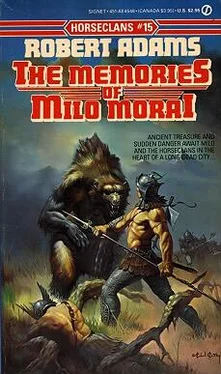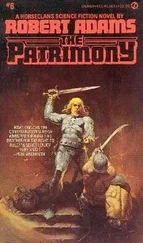“You ten and Schrader had better go back to the BOQ and pack up. You’ll all be moving this afternoon to the small compound on the other side of the post; it’s that facility of which you will have charge, Milo. You’ll have our own Brunhild and four of her WAACs for your headquarters staff, plus Schrader, of course. There’s a small mess hall and hot food will be trucked in to you three times each day, but keeping the place and the trays clean will be up to you and your WAACs.
“This all is being done this way solely for the purpose of isolating you and your interviewees, of making damned certain that as few people here ever see them as possible. They’ll be brought into your compound in sealed transport and they’ll leave in exactly the same way. Under no circumstances are any of them to leave that compound at any time until you have finished with them.”
“Uhh, sir . ..“ said Betty hesitantly. “What about a medical emergency? What happens then?”
Barstow nodded once.“A very good point, Betty. In such a case, whatever the hour, you will ring me up and I will send or bring personnel appropriate to the situation you describe from the dispensary, out here.”
“What kind of billets are we drawing, sir?” asked the woman called Judy.
Barstow nodded again. “There’s an old CCC-type barrack building with a detached latrine that the WAACs will have, and another which will house your subjects. There is one three-bedroom bungalow that will be the billet of the three doctors and two-bedroom ones for the rest of you; how you pair off is your business.”
“Are we all going to be locked up day and night in that compound, too, general?” Hugo demanded in his thick Westphalian accent.
Barstow shook his head.“No, not at all, Hugo. Mjlo, Schrader and Sergeant Stupsnasig will have keys to the gate and to the control box for the fence power. The compound is designed more with the aim of keeping unauthorized people out of it than of keeping you all in. But, Hugo, and all the rest of you, too, hear me and hear me well. No one of you will have fire-arms, while the outside guards will have them, along with the orders to use them should any person try to go over or under or through the wire or the gate. This is no makework we’re doing here, it is an operation of earthshaking importance to the Army, the nation and the world.”
Barstow’s voice had risen, become quite adamant, as he spoke the last sentence. Now he lowered his speaking voice. “There are going to be, as I said, similarities in the conduct of this operation to our previous operation in Munich, but there are going to be glaring dissimilarities, too. In Munich, one of our primary functions was that of finding out, of unmasking, former SS, members of the Nazi Party, bureaucrats, non-German collaborators and the like who were trying to pass themselves off as innocent, abused displaced persons.
“In this operation, on the other hand, it will not be up to any of the military interviewers to make value judgments on the interviewees. The doctors, alone, will make the decisions as to just how useful the individuals will be, and their decisions will be all based upon other things than the politics or the former military activities or affiliations of the subjects in question.
. “Those of you who were combat officers or active operatives with General Donovan may dislike some of our new subjects instantly, on first meeting, subconsciously recognizing them as the Enemy. But you all are just going to have to force your conscious to override your subconscious, for the old war is done and now a new one has begun for our nation, our way of life, and, like it or not, these subjects will be allies in this new war, potentially very valuable allies indeed, and they must at all times be treated as such, no matter how they may have behaved in the past, how they behave now or how you may feel about them and their past deeds, gutwise.”
“In other, plainer words, general,” said the man called Buck, dryly, “you are setting us up here to coddle and kowtow to a passel of Nazi and quisling war criminals, right? Men who would likely be, rightly be, shot or hung or at least imprisoned did they remain in Europe, right?”
Barstow shook his head. “You’re not very good at following orders, Buck, are you? Didn’t I just say that none of you are to make any value judgments based upon the supposed deeds or misdeeds of our incoming subjects? You’ve been with me for some time, and, frankly, I’d expected more professional conduct from you.
“I reiterate, ladies and gentlemen: the Second World War is over, done; the initial skirmishings of the new war are already commencing, but not easily visible yet. The subjects who are coming in to us have the potential, many of them, to be extremely valuable to us, to the United States of America and all other free people everywhere, to be of great help in thwarting or defeating the totalitarian aims of the new enemy.
“It has been said that the art of politics makes for exceedingly strange bedfellows. Well, the art of modern warfare makes for even stranger ones, I assure you all. Believe me, I was shocked, too—shocked to the very core of my being—when my superiors gave me this assignment and told me what my people and I would be doing on this Operation Newhaven, but as I already knew and knew well, the danger, the deadly peril, we all face whether or not we know it, I could immediately grasp the necessity of salving over old prejudices and accepting former enemies as respected allies if not as friends. You, Buck, and all the rest of you must follow my lead and do the same. If any of you feel that you cannot, for whatever reason or none, tell me now and I will replace you before any of the operation has started. Well . . . ?”
Milo and Betty wound up sharing a bungalow with Buck and Judy. Buck was a compact, wiry man a bit under average height, with thin, brown hair and gray eyes flecked with green. Always graceful, he was capable of moving as silently and as swiftly as a cat, in some of his ways reminding Milo of certain of the traits of Jethro Stiles. His English had aspects and sounds of Britain, but his Hochdeutsch and his French were both flawless and accentless.
Judy was a little taller than Buck. She was round-faced, rosy-cheeked, with thick hair of a chestnut hue. Her arms and legs were thick, but her body was well proportioned, her teeth white and even and her hazel eyes thick-lashed. In a dirndl, she would have looked the very picture, thought Milo, of a strong, healthy, happy Bavarian peasant woman. And her Hochdeutsch was sprinkled well with the accents and idioms of Bavaria and Westphalia.
Milo was certain that Buck and Judy were in love, but theirs was an easygoing, relaxed relationship, with little or no public traces of touchings to advertise their emotional attachment one to the other. Back in Germany, he had not known either of the two of them any better than he had then known Betty. Back in Germany, indeed, Milo had spent the most of his nonduty time alone—reading avidly of both English and German books, anything onto which he had been able to lay hands, sipping schnapps and whisky and cognac and wines, trying to wind down to near-normalcy after the long months of privation, squalor, combat, fear and sudden death. Now he was getting to know these coworkers as housemates and friends.
The work they all were doing with the mostly German interviewees had progressed smoothly to date, sixteen men having passed through their hands thus far—fourteen Germans, one Norwegian and one of Rumanian origin. The three doctors had passed on twelve of these men to whatever came after this Operation Newhaven. Barstow had mentioned in an oblique manner that those not passed on were to be speedily repatriated to whatever internment camps they had originally been plucked from and left to whatever fates their wartime activities had earned them from the victorious allies.
Читать дальше












